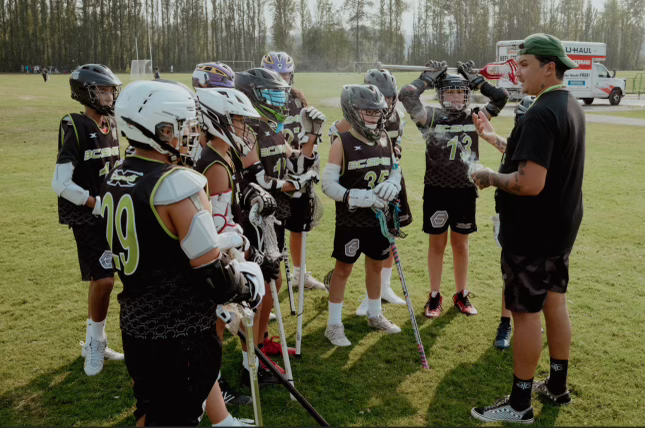
By Tdohasan Sunray
Lacrosse is more than a sport. It is something more powerful and ritualistic in nature: ceremony. The ceremony itself comes from the Haudenosaunee people, also known as the Iroquois, who still inhabit their traditional homelands in the northeastern parts of the United States, reaching as far as Canada.
The game was used as an alternative to war in order to settle disputes among tribal members. In the traditional Haudenosaunee origin story, the sport is said to have come from Sky Woman, an integral being to the Haudenosaunee’s creation stories of both the world and lacrosse. Various other tribal communities have similar styles of stick and ball games, most notably the double stick game of the tribes in the southeastern parts of the country. To put it plainly, lacrosse is a sport steeped in native traditions.
Following in this tradition, JD Elquist is University of Puget Sound’s head men’s club lacrosse coach. He is also the founder of Pacific Northwest Native Lacrosse, a program that according to its website seeks to “increase the accessibility and representation of native youth in the sport of lacrosse” by hosting clinics and camps throughout the state of Washington.
While Coach Elquist was born in Northern Nevada, he is Sugpiaq, a people from Alaska’s Prince William Sound region. Although his people never historically played lacrosse, he recognizes the important role that all native people have in facilitating its future. His own involvement with lacrosse dates back 23 years, when he was first introduced to the sport in middle school.
“So this native ed teacher, who I actually didn’t like, was the first person ever to talk about lacrosse with me. It was kind of Creator ordained. I felt like Creator gave me that game through that person at that moment, and I felt love. There’s something about the game, once I started researching to get into it, that really just gravitated towards me as a young person,” Coach Elquist said. He later discovered that this “something” is what he calls “the spirit of the game.”
One place where that spirit has been lacking is at Puget Sound. Although the University has had intermittent bouts of the men’s lacrosse club being active on campus, it has never attained the longevity that Coach Elquist seeks to create. Too often, campus clubs and activities find themselves in disarray, with the influx – and subsequent exodus – of students who either aren’t fully committed or don’t have a plan in place for the transition to the next batch of students when it comes their time to graduate.
“My hope is that I can just be here long term. I live here, my family’s here, my life is here. And I believe in, you know, building programs versus going at the top. I’d rather build from scratch,” he stated.
Coach Elquist is very familiar with the process of building from the ground up; it’s how he came to know the sport. “Didn’t have a lacrosse stick, didn’t have access to gear, and just fell in love with this game,” he said. He has been able to follow that same framework through the reinstatement of the men’s lacrosse club at the university. One of his other crucial endeavors has been the creation of the youth outreach group Pacific Northwest Native Lacrosse.
Reinvigorating and educating athletes on the traditional teachings of lacrosse has become increasingly rare. Coach Elquist went on to say, “And what I was frustrated by is that playing was so far removed, not from my own coaching, but just for what the game has become, so far removed from what it is, so I was like, I gotta change that.” To combat that, kids at Pacific Northwest Native Lacrosse are taught about smudging (a sacred ceremony where medicinal plants are burnt to cleanse, heal and connect individuals with the Creator), told traditional stories of how lacrosse came to be and taught why it matters today. Coach Elquist recognizes that the reimplementation of these teachings are vital. “It’s camps and clinics, like lacrosse camps in tribal communities. It’s finding other native kids playing the game, putting them on travel, competitive teams, going and competing in these spaces. And thirdly, it’s like advocacy and education, but it’s all rooted. The difference between lacrosse and native lacrosse is our culture.”
The ceremony of lacrosse can instill a sense of identity in the player. It can educate. It can heal. “Lacrosse has healed me and continues to heal me daily,” Coach Elquist said. This healing can only happen if the sport is approached in the right way. History is at the heart of the ceremony of lacrosse, and that can never be forgotten. If that history were erased or overlooked, the sport would lose the workings and teachings of generations. In his position at the university and through his youth outreach program Pacific Northwest Native Lacrosse, Coach Elquist wants to share that history and maybe create a little bit of his own.
“It holds a lot of power because it’s like, you know, we can literally see to help decolonize a space that’s been overly colonized. And like, if you love the game of lacrosse, if you love the game of lacrosse, you have to love the origins of the game.”
